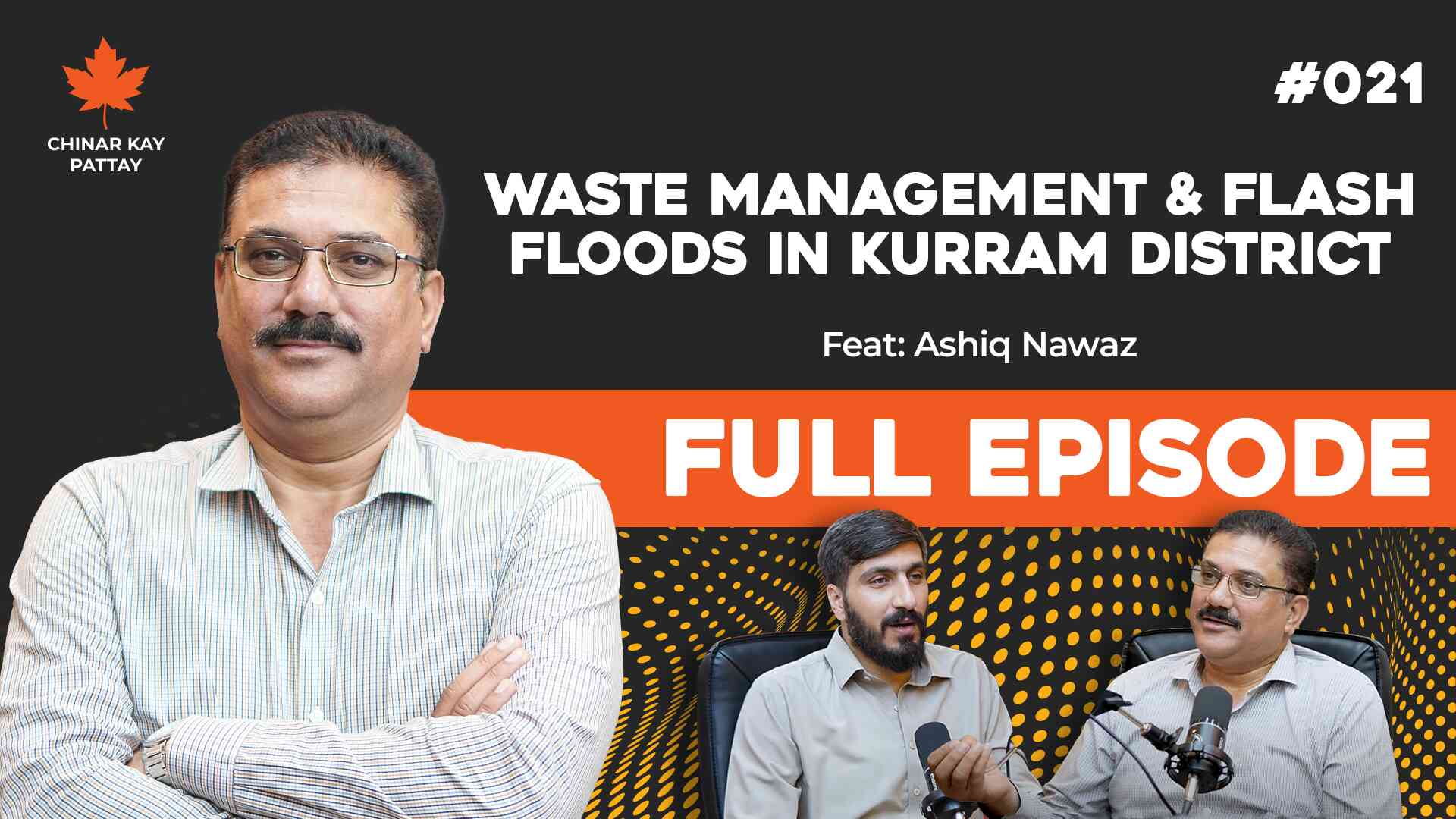Table of Contents
Waste Management and Flash Floods are two pressing issues facing the Kurram District, particularly in Parachinar. In our latest episode of the Chinar Kay Pattay Podcast, we had the privilege of speaking with Mr. Ashiq Nawaz, the Director of Environmental Impact Assessment and Monitoring at the Pakistan Environmental Protection Agency. This episode dives deep into the critical issues of waste management and flash floods in Parachinar, Kurram District, shedding light on the challenges and potential solutions that can help create a more sustainable environment.
Watch the Full Podcast
The Importance of Waste Management in Parachinar
Current Challenges in Waste Disposal
Waste management is a pressing issue in Parachinar, where rapid urbanization and population growth have led to an overwhelming increase in waste generation. Mr. Nawaz emphasized that inadequate waste disposal systems are at the core of this problem. Many areas lack proper waste collection services, leading to the accumulation of garbage in public spaces. This not only creates an unsightly environment but also poses serious health risks to the community.
Environmental Impact
The environmental ramifications of poor waste management are severe. Uncontrolled waste disposal contributes to soil and water contamination, affecting local ecosystems and agricultural productivity. Mr. Nawaz highlighted that the leachate from waste can seep into groundwater supplies, jeopardizing drinking water quality. This contamination cycle can lead to health issues for residents and disrupt the agricultural activities that many families rely on for their livelihoods.
Effects on Local Agriculture
Agriculture is vital to Kurram District’s economy, but the adverse effects of waste on agricultural practices cannot be overlooked. Contaminated soil diminishes crop yields and compromises the safety of food produced in the region. Mr. Nawaz pointed out that many local farmers are unaware of the dangers posed by waste accumulation, which complicates the issue. Therefore, educating farmers about sustainable agricultural practices and the importance of a clean environment is essential.
The Threat of Flash Floods
Growing Risks Due to Urbanization and Climate Change
Flash floods have become an increasing threat to Parachinar, particularly during the monsoon season. Mr. Nawaz discussed how rapid urbanization, deforestation, and climate change have exacerbated the risk of flooding in the area. The changes in weather patterns lead to intense rainfall and rapid snowmelt from the Koh-e-Sufaid mountain range, resulting in devastating floods that can cause significant damage to infrastructure, homes, and agricultural land.
The Impact of Climate Change on Koh-e-Sufaid
The Koh-e-Sufaid mountain range is crucial for the region’s climate and hydrology. However, climate change has led to unpredictable weather patterns and increased rainfall, intensifying the risks associated with flash floods. Mr. Nawaz pointed out that the changing climate disrupts traditional farming cycles, making it challenging for farmers to adapt to new conditions.
Potential Solutions for Flood Mitigation
Addressing the threat of flash floods requires a multifaceted approach. Mr. Nawaz outlined several strategies for mitigating flood risks, including:
- Afforestation: Planting trees can help absorb rainwater and reduce runoff, which can lessen flood severity.
- Improved Drainage Systems: Implementing effective drainage systems can facilitate better water flow and minimize the impact of heavy rains.
- Community Engagement: Educating local communities about flood risks and involving them in disaster preparedness can improve resilience against flooding events.
The Role of Tehsil Municipal Administration (TMA)
Responsibilities in Waste Management and Flood Control
The Tehsil Municipal Administration (TMA) has a crucial role to play in enhancing waste management and flood control in Parachinar. Mr. Nawaz explained that TMA is responsible for enforcing waste management regulations, maintaining public cleanliness, and implementing flood control measures. However, the effectiveness of TMA initiatives often faces challenges, such as a lack of resources and community engagement.
To improve waste management, TMA must focus on establishing efficient waste collection systems and accessible disposal facilities. Collaboration with local communities and NGOs can foster a culture of environmental stewardship and encourage residents to participate in waste management initiatives actively.
Addressing Plastic Pollution
Initiatives to Reduce Single-Use Plastics
Plastic pollution is a critical concern in Parachinar, as single-use plastics contribute significantly to the waste crisis. Mr. Nawaz highlighted ongoing initiatives aimed at reducing plastic usage, including public awareness campaigns and community outreach programs. These initiatives are designed to educate residents about the detrimental effects of plastic on the environment and promote the use of alternative, eco-friendly products.
Public Awareness Campaigns
Raising public awareness about the dangers of plastic pollution and the importance of recycling is essential for changing consumer behavior. Mr. Nawaz emphasized that engaging the community through workshops and educational programs can significantly impact plastic usage reduction.
Waste Management as a Business Opportunity
Economic Potential in Recycling and Composting
Waste management presents not only an environmental challenge but also an economic opportunity for the people of Parachinar. Mr. Nawaz discussed how investing in recycling and composting could be turned into viable business ventures. By developing recycling facilities and composting programs, local entrepreneurs can create jobs while simultaneously addressing waste management challenges.
Case Studies and Success Stories
The podcast highlighted successful case studies from other regions where waste management initiatives have transformed local economies. With the right support and resources, Parachinar can adopt similar strategies and turn waste into a valuable resource.
Final Thoughts
The conversation with Mr. Ashiq Nawaz was enlightening and filled with practical solutions for the intertwined challenges of waste management and flash floods in Kurram District. As community members, it is imperative that we take action and engage with local authorities to advocate for sustainable waste management practices and flood control measures.
Summary of Key Takeaways
- The urgent need for improved waste management systems in Parachinar to protect health and the environment.
- The increasing risk of flash floods exacerbated by climate change and urbanization.
- The critical role of TMA in implementing effective waste management and flood control strategies.
- The importance of public awareness campaigns to address plastic pollution.
- The potential for economic growth through recycling and composting initiatives.
Call for Community Engagement
Community involvement is essential for creating a cleaner and safer environment for future generations. Mr. Nawaz’s insights remind us that collective action at the grassroots level can lead to significant change. By participating in local initiatives and advocating for sustainable practices, we can all contribute to a healthier environment.
Watch the Full Podcast
For a more in-depth exploration of these vital topics, be sure to watch the full podcast episode featuring Mr. Ashiq Nawaz:
🔔 Don’t forget to like, share, and subscribe for more insightful conversations on Kurram District’s issues and solutions!
Connect with Us
Stay updated on our latest content and initiatives by following us on social media:





